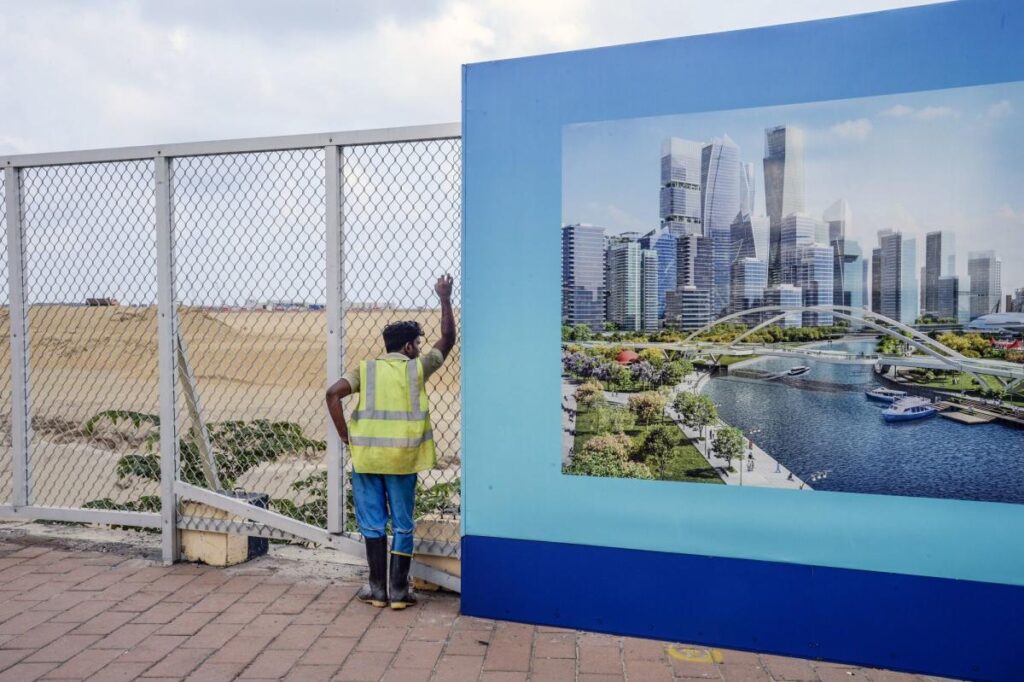(Bloomberg) — A candidate with roots in Sri Lanka’s Marxist-socialist policies is gaining popularity in next month’s presidential election with a strong message to fight corruption and explore investment deals with China to avoid a new debt trap.
Most read from Bloomberg
Anura Kumara Dissanayake, better known as AKD, leads National People’s Power, a coalition of left-wing political parties and groups backed by protesters who toppled the powerful Rajapaksa government in 2022. He has emerged as a major challenger to incumbent President Ranil Wickremesinghe, who remains unpopular over his austerity measures in exchange for a bailout from the International Monetary Fund.
Dissanayake is campaigning on a platform of clean governance and fighting corruption in a country still struggling with high debts, two years after an unprecedented economic crisis and a historic default. Sri Lanka’s debts had ballooned over the years, partly because of Chinese loans to finance ambitious projects ranging from ports, roads and a “lotus tower”.
Beijing is accused of burdening developing countries such as Sri Lanka with debt through the financing of infrastructure projects, allegations that it denies.
China has been an “easy source of money” for previous governments and the NPP wants to ensure that future investments are not wasted, said Harini Amarasuriya, a lawmaker and member of the coalition.
“We don’t want easy money coming in to finance unproductive projects and we don’t care about corruption,” Amarasuriya, an academic who has become one of the group’s more public faces, said in an interview in the capital, Colombo. “That’s what we expect from every country, and that’s what we would want with China as well.”
The coalition’s main party is the left-wing Janatha Vimukthi Peramuna, led by Dissanayake. The JVP was once known for its violent uprisings in the 1970s and 1980s, but has since reimagined itself and entered mainstream politics. Some polls have pegged Dissanayake as a leading contender for the September 21 elections, while he draws large crowds at his campaign rallies.
Dissanayake is backed by the 2022 protesters, who wanted to curb the executive powers of the presidency, root out corruption and hold the ruling Rajapaksa clan to account for their role in bankrupting the country. The Rajapaksas cultivated ties with China to help rebuild the country in the 2010s after brutally ending a decades-long civil war with Tamil separatists.
Amarasuriya said the left-wing coalition wants to maintain ties with China because the country was one of the few countries that supported Sri Lanka when it faced global scrutiny for human rights abuses as the civil war ended.
“We are aware that China has supported us politically at sensitive times,” she said. “And we want to maintain those relations.”
IMF bailout
The leftist candidate’s popularity adds to political uncertainty, which could jeopardize Sri Lanka’s debt restructuring deal with creditors and delay IMF bailout funding.
“Markets have no past experience to make a judgment on NPP policies,” said Thilina Panduwawela, a senior economist at Frontier Research in Colombo. “And the elections themselves are too close to predict and therefore there is some uncertainty in the markets.”
Main opposition leader Sajith Premadasa, who leads a breakaway movement from Wickremesinghe’s party, and Namal Rajapaksa, a scion of the populist clan, are also running in the election.
Amarasuriya said her party opposed some of the tax measures introduced by Wickremesinghe’s government to meet IMF targets, but acknowledged that the terms of the loan program, including the primary balance and debt-to-GDP ratio, were “fairly standard.”
Dissanayake’s election manifesto, launched on August 26, proposes a number of tax changes and greater oversight of government spending.
He has promised to increase the income tax exemption threshold and adjust the rates and tax brackets “fairly”. He also wants to remove some essential health, education and food items from the 18% GST to make them more affordable, Amarasuriya said. The tax threshold has had a huge impact on the middle class and professionals, she said, leading to a severe brain drain with over 3,000 doctors and IT and banking staff leaving the country.
Amarasuriya added that the current government “has not paid enough attention” to a number of other IMF conditions, including strengthening social security networks and eradicating corruption.
In the case of corruption, the approach will be to “clean it up from the top,” with all elected representatives required to conduct themselves according to a code of conduct that is strictly enforced, she said. There will be restrictions on government appointments and procurement procedures — two areas where “corruption is initiated,” Amarasuriya said.
Foreign investors have “nothing to fear,” she added, as the party will make doing business easier by eradicating corruption and putting systems in place.
–With assistance from Asantha Sirimanne.
Most read from Bloomberg Businessweek
©2024 Bloomberg LP







